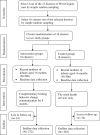Effect of complementary feeding behavior change communication delivered through community-level actors on dietary adequacy of infants in rural communities of West Gojjam Zone, Northwest Ethiopia: A cluster-randomized controlled trial
- PMID: 32881945
- PMCID: PMC7470293
- DOI: 10.1371/journal.pone.0238355
Effect of complementary feeding behavior change communication delivered through community-level actors on dietary adequacy of infants in rural communities of West Gojjam Zone, Northwest Ethiopia: A cluster-randomized controlled trial
Abstract
Background: Attaining the recommended level of adequacy of the infant's diet remains a serious challenge in most developing countries. Complementary foods, particularly in developing countries, are inadequate in quality and quantity that can result in adverse health and nutrition consequences in infants. This could be not only because of lack of food but also associated with caregiver's poor knowledge, harmful cultural norms and behaviors on infant feeding. The promotion of optimal complementary feeding through behavior change interventions is a global health priority. However, many of the interventions targeted only mothers/caregivers of infants, and studies that engaged other family members are limited worldwide. Moreover, such interventions are scarce in developing countries, including Ethiopia. This trial aimed to evaluate the effectiveness of complementary feeding behavior change communication delivered through community-level actors on the dietary adequacy of infants.
Methods: We conducted a cluster-randomized controlled trial in rural communities of West Gojjam Zone, Northwest Ethiopia. Trial participants in the intervention clusters received complementary feeding behavior change communication for 9 months whereas those in the control clusters received only the usual care. Trained women development army leaders delivered the intervention. A pre-tested, structured interviewer-administered questionnaire was used for data collection. Generalized estimating equations regression analyses adjusted for baseline covariates and clustering were used to test the intervention effects.
Results: The intervention showed positive statistically significant effects on the consumption of dairy products [RR = 1.8; 95% CI: 1.04-3.13], eggs [RR = 3; 95% CI: 1.35-6.56], vitamin A-rich fruits and vegetables [RR = 2.7; 95% CI: 1.17-6.1], other fruits and vegetables [RR = 5; 95% CI: 2.49-10.58] and animal-source foods [RR = 2; 95% CI: 1.39-2.87]. The proportions of infants who achieved minimum dietary diversity [RR = 3; 95% CI: 1.34, 7.39], minimum meal frequency [RR = 2.4; 95% CI: 1.37-4.29], and minimum acceptable diet [RR = 2.7; 95% CI: 1.13-7.23] were significantly higher in the intervention as compared to control groups.
Conclusions: Complementary feeding behavior change communication delivered through community-level actors significantly improved the dietary adequacy of infants.
Trial registration: ClinicalTrials.gov, NCT03488680. Registered 5 April 2018- Retrospectively registered, https://clinicaltrials.gov/ct2/show/NCT03488680.
Conflict of interest statement
The authors have declared that no competing interests exist.
Figures
References
-
- Central Statistical Agency (CSA) [Ethiopia] and ICF. 2017. 2016 Ethiopia Demographic and Health Survey Key Findings. Addis Ababa, Ethiopia, and Rockville, Maryland, USA. CSA and ICF.
Publication types
MeSH terms
Associated data
LinkOut - more resources
Full Text Sources
Medical
Miscellaneous



